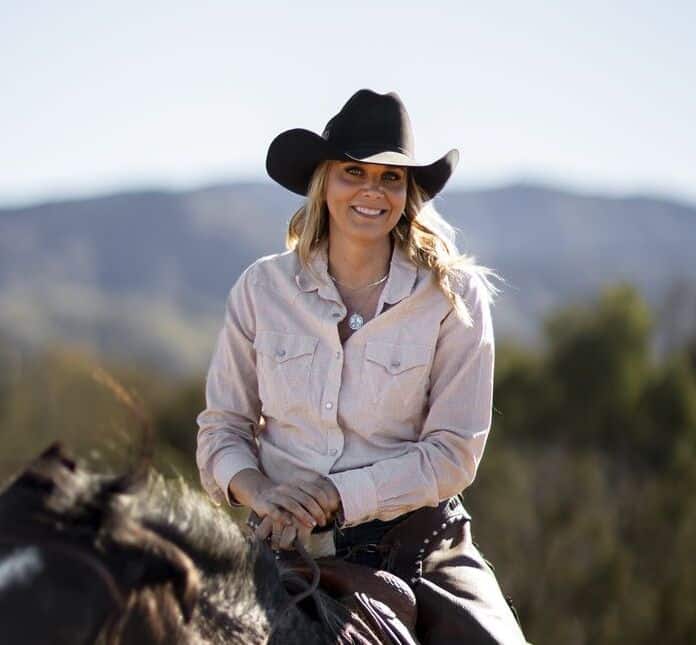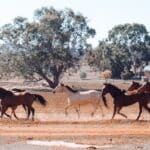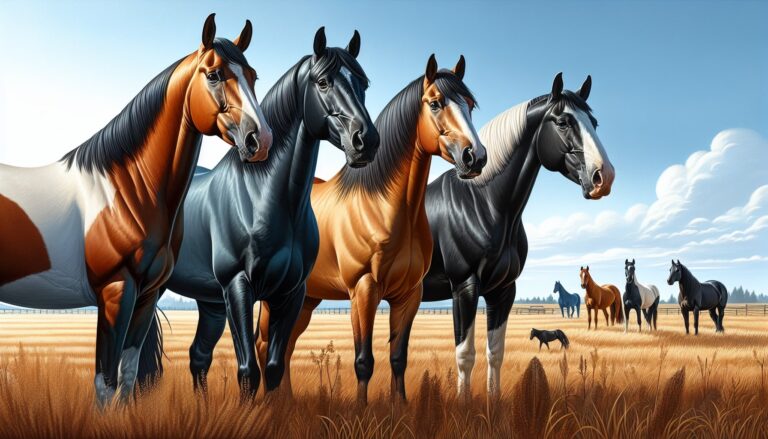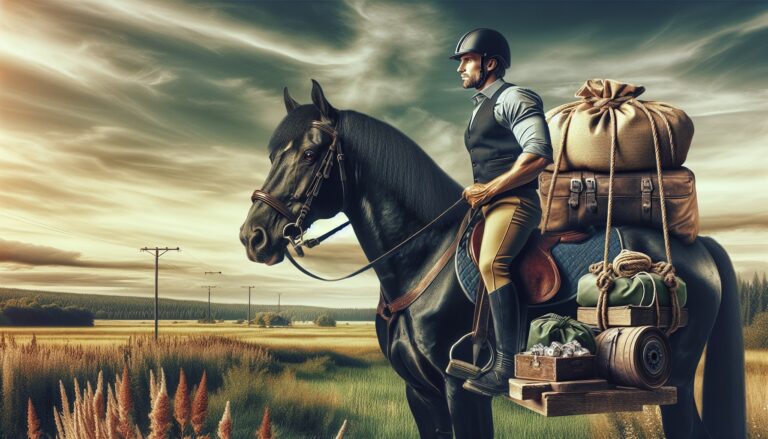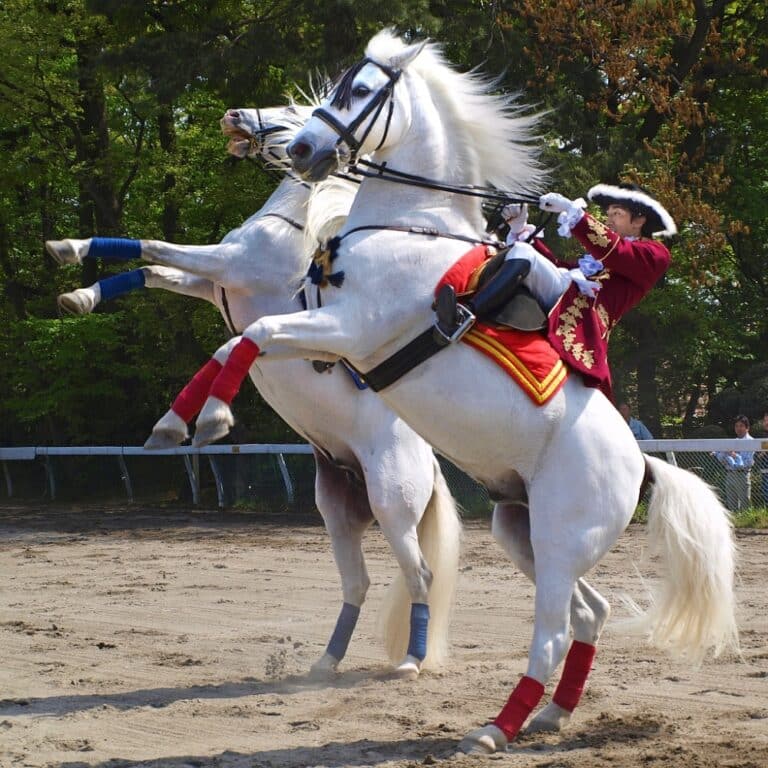
Welcome, noble reader! If you’re here, then you’re probably on a quest to find a fitting name for your horse, a name that carries the weight of history and the pride of nobility. You’re looking for medieval horse names that resonate with power, majesty, and the thrilling tales of knights and kings of yore. Well, you’ve come to the right place!
Medieval horse names are not just names. They are a badge of honor, an emblem of strength, and a symbol of the bond between the rider and the steed. They were considered as significant as the noble knights who rode them into battles, tournaments, and epic adventures. The name of a horse could even reflect the character, personality, or physical attributes of the animal, making it unique and special.
In the medieval era, horses were invaluable assets. They were the companions of knights, the vehicles of nobles, and the symbols of wealth and power. As such, they were given names that reflected their importance and the reverence with which they were viewed. This article will guide you through a treasure trove of medieval horse names, helping you to discover the perfect moniker for your gallant companion.
- The Importance of Horse Names in Medieval Times
- 37 Popular Medieval Horse Names
- 36 Knight Horse Names
- 36 Steed Names
- Unusual and Unique Medieval Names for Horses
- Noble Horse Names
- Medieval War Horse Name
- Famous Medieval Horse Names
- How to Choose the Perfect Medieval Horse Name?
- Medieval Horse Names Inspired by Literature and History
- Embrace the Past with Your Horse’s Name
The Importance of Horse Names in Medieval Times
In the Middle Ages, just like today, names held power. For a knight, his horse was more than just a means of transportation. It was his partner, his confidant, and his most trusted ally. Therefore, it wasn’t uncommon for knights to give their horses names that signified strength, bravery, loyalty, or nobility, reflecting the symbiotic relationship between them.
Horses were not just pets or possessions in those times. They were friends, partners, and often, they were the difference between life and death. To name a horse was to bestow upon it an identity and a sense of self. It was a solemn act, one that was often accompanied by a ceremony, a testament to the horse’s importance in the knight’s life.
Moreover, horse names were used as an identifier, just as our surnames are today. It helped distinguish one horse from another, especially in battles or tournaments. A knight’s reputation was often tied to his horse, and a well-named horse could bring honor and respect to its rider. Hence, horse names were chosen carefully and thoughtfully, and they carried great significance.
37 Popular Medieval Horse Names
Now that we’ve delved into the importance of medieval horse names let’s explore some popular monikers from that era. Each of these names carries a story, a legend, or an attribute that has endured the passage of time.
Names like “Destrier,” a term used for war horses, or “Courser,” which referred to a swift and strong horse, were quite popular. “Palfrey,” a name given to riding horses, especially those used by nobles or ladies, was another common medieval horse name.
Other popular medieval horse names included:
- Rouncey
- Sumpter
- Charger
- Bayard
- Bucephalus
- Rosinante
- Gringolet (Sir Gawain’s horse)
- Frenzy (Known for wild temperament)
- Paladin (A heroic champion)
- Sable (A common color for horses)
- Goliath (For large, strong horses)
- Hector (After the Trojan hero)
- Merlin (A magical name)
- Cavalier (Meaning horseman)
- Damsel (For a lady’s horse)
- Galahad (After the knight of the Round Table)
- Templar (After the Knights Templar)
- Crusader (For a horse that’s been through battles)
- Falcon (Swift as a bird)
- Baron (Noble stature)
- Griffin (Mythical creature)
- Dragoon (Mounted infantry)
- Jester (For playful horses)
- Minstrel (For horses with a melodious gait)
- Orion (After the hunter in Greek mythology)
- Saracen (An Arabian horse)
- Troy (After the ancient city)
- Valiant (For brave horses)
- Windsor (Regal name)
- Zephyr (For swift horses)
- Archer (For horses used in archery)
- Caesar (Regal and commanding)
- Duke (Noble title)
- Freya (Norse goddess)
- Guinevere (Queen in Arthurian legend)
- Herald (For a messenger horse)
- Ivanhoe (From the historical novel)
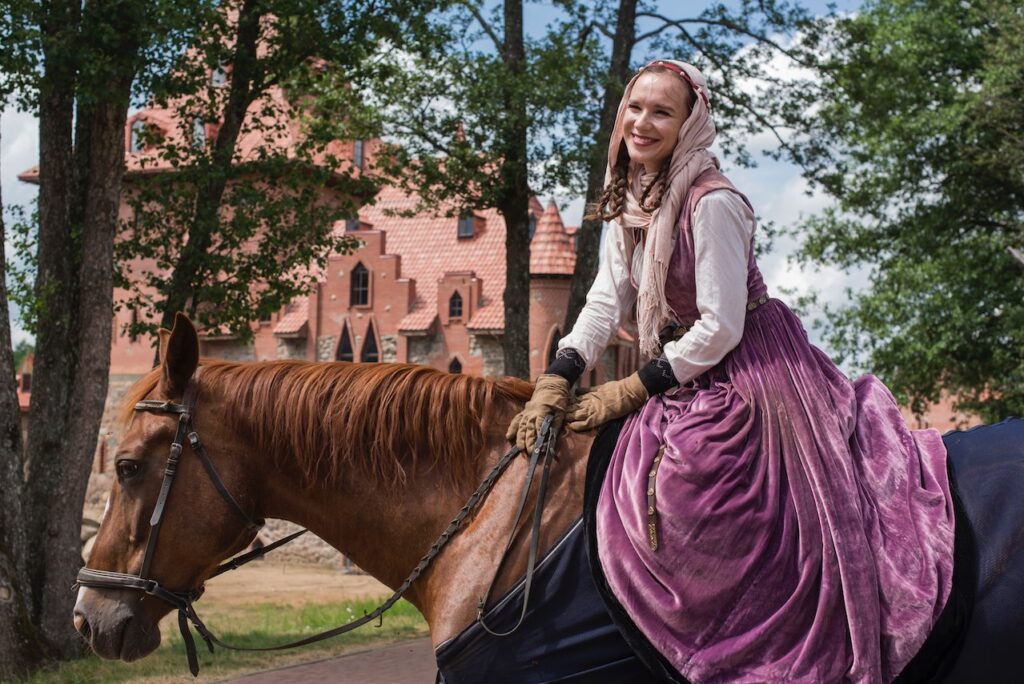
36 Knight Horse Names
Knights were the shining stars of the medieval era, their gallant exploits and tales of bravery echoing through the ages. Their horses, too, held a place of honor, their names reflecting the valor and courage of their riders. Knight horse names are a tribute to the bravery and nobility of these warrior men and their loyal steeds.
Names like “Valor,” “Braveheart,” “Knightly,” and “Gallant” were commonly used, embodying the courage and chivalry of knights. Other knight horse names include:
- Excalibur
- Lancelot
- Quest (For horses on a noble mission)
- Shield (A protector)
- Sword (For a horse that cuts through the battlefield)
- Chivalry (The code knights live by)
- Honor (For a trustworthy steed)
- Glory (For a horse that brings its rider fame)
- Victory (For a triumphant horse)
- Justice (For a horse that stands for righteousness)
- Avenger (For a horse that seeks justice)
- Defender (For a protective horse)
- Hero (For a horse that saves the day)
- Champion (For a horse that wins battles)
- Warrior (For a horse that fights bravely)
- Conqueror (For a horse that helps win territories)
- Legend (For a horse that becomes a story)
- Noble (For a horse with a noble spirit)
- Fearless (For a horse that knows no fear)
- Invincible (For a horse that seems unbeatable)
- Fierce (For a horse with a strong spirit)
- Dauntless (For a horse that is not easily discouraged)
- Lionheart (For a horse with the heart of a lion)
- Vindicator (For a horse that proves its worth)
- Triumph (For a horse that embodies success)
- Renown (For a horse that gains fame)
- Majestic (For a horse with a grand presence)
- Daring (For a horse that takes risks)
- Resolute (For a steadfast horse)
- Prowess (For a horse with great skill)
- Fortitude (For a horse with mental strength)
- Integrity (For a horse that embodies honesty)
- Tenacity (For a persistent horse)
- Gallantry (For a horse that is exceptionally brave)
- Vigilant (For a watchful horse)
- Sentinel (For a guarding horse)
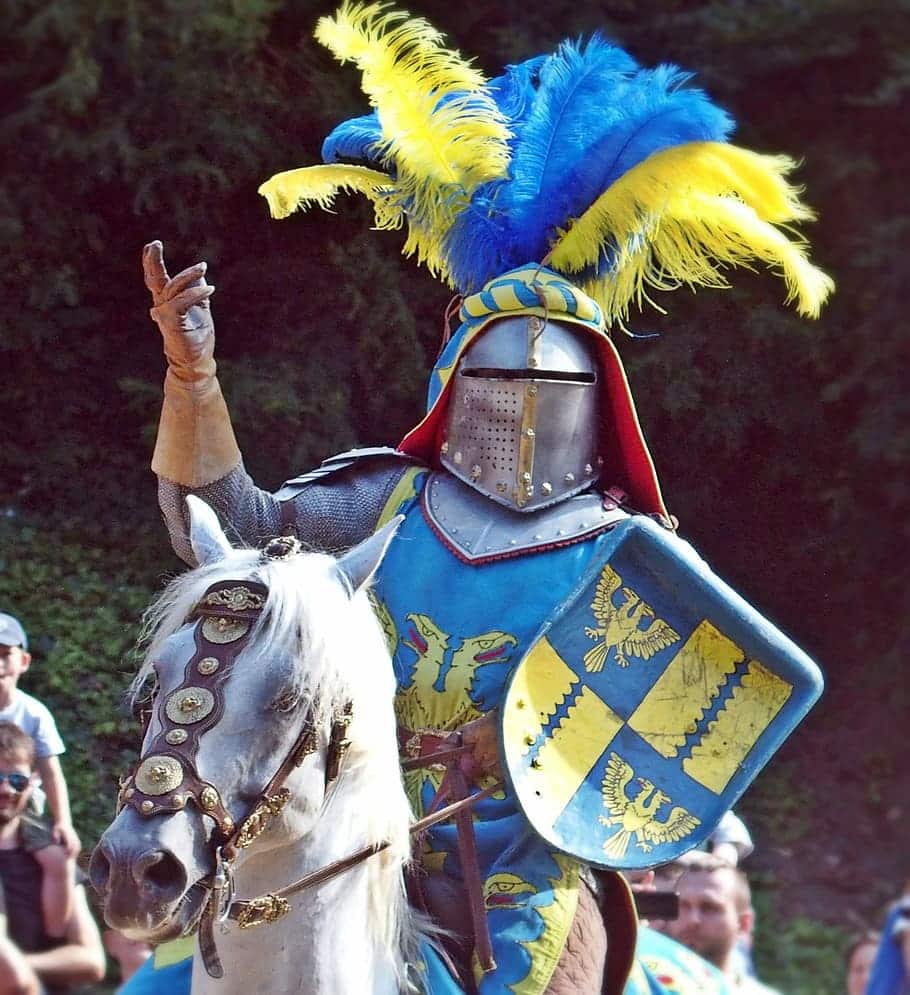
36 Steed Names
The term “steed” was used in medieval times to refer to a horse ridden by a knight or noble. These steeds were not ordinary horses. They were carefully bred and trained for warfare, known for their strength, stamina, and courage. As such, steed names often symbolized these characteristics, reflecting the animal’s physical prowess and unyielding loyalty.
Names like “Thunder,” “Storm,” “Mighty,” and “Stalwart” were often used for these warhorses, embodying their strength and endurance. Other names include:
- Loyal
- Trusty
- Faithful
- Steadfast
- Titan (For a strong and large horse)
- Hercules (For a horse with great strength)
- Ironclad (For a horse that’s tough)
- Granite (For a horse that’s unyielding)
- Endurance (For a horse that can go the distance)
- Reliant (For a dependable horse)
- Squire (For a horse serving a knight)
- Guardian (For a protective horse)
- Fort (For a horse that’s a stronghold)
- Bastion (For a horse that stands like a fortress)
- Warden (For a horse that guards)
- Zeal (For a horse with great enthusiasm)
- Vigor (For a horse full of life and energy)
- Dynamo (For a horse that’s a powerhouse)
- Atlas (For a horse that carries the world)
- Spartan (For a horse that’s disciplined)
- Indomitable (For an unbeatable horse)
- Fidelity (For a loyal horse)
- Allegiance (For a horse that’s true to its rider)
- Devotion (For a committed horse)
- Oathkeeper (For a horse that upholds promises)
- Covenant (For a horse that’s part of a pact)
- Resolve (For a determined horse)
- Backbone (For a horse that provides strong support)
- Pillar (For a horse that’s a mainstay)
- Anchor (For a horse that provides stability)
- Obedient (For a horse that listens well)
- Constant (For a horse that’s always there)
- Unyielding (For a horse that won’t back down)
- Resilient (For a horse that bounces back)
- Unbreakable (For a horse that can’t be defeated)
- Trueheart (For a horse that’s genuine and sincere)
Unusual and Unique Medieval Names for Horses
If you’re looking for something different, something that stands out from the crowd, then you might want to consider some unusual and unique medieval names for horses. These are names that are steeped in history and mythology but are not as common or well-known as others.
Names like “Epona,” the Celtic goddess of horses, or “Hengroen,” King Arthur’s horse, are unique and rich in mythological significance. Other unusual medieval names for horses include “Arion,” a legendary horse in Greek mythology, and “Gulltoppr,” a horse belonging to the Norse god Heimdall.
Then there are names like “Fleance,” “Imbreus,” and “Tybalt,” which are drawn from Shakespeare’s plays, carrying a literary charm and elegance. These unique medieval horse names offer a wealth of options for those seeking something different, something that stands out and resonates with the grandeur and mystique of the medieval era.
Here are 33 additional unique names for medieval horses:
- Sleipnir (Odin’s eight-legged horse in Norse mythology)
- Xanthus (One of Achilles’ horses in Greek mythology)
- Balios (Another of Achilles’ horses in Greek mythology)
- Hippogriff (A mythical creature, part horse and part eagle)
- Pooka (A shape-shifting creature from Celtic folklore)
- Skinfaxi (The horse that pulls the day in Norse mythology)
- Hrimfaxi (The horse that pulls the night in Norse mythology)
- Alastor (A name with mythological and literary origins)
- Fafnir (A dragon turned horse in Norse mythology)
- Quixote (After Don Quixote, who rode Rosinante)
- Oberon (King of the fairies in “A Midsummer Night’s Dream”)
- Pegasus (The winged horse in Greek mythology)
- Chimera (A mythical creature, part lion, part goat, part snake)
- Wyrm (Old English for ‘dragon’)
- Hippolyta (Queen of the Amazons in Greek mythology)
- Caliburn (Another name for Excalibur)
- Mordred (Villain in Arthurian legend)
- Beowulf (Hero of the Old English epic poem)
- Fenrir (A monstrous wolf in Norse mythology)
- Valkyrie (Chooser of the slain in Norse mythology)
- Yggdrasil (The world tree in Norse mythology)
- Cú Chulainn (Hero of Irish mythology)
- Morrigan (Goddess of fate in Irish mythology)
- Sigurd (Hero in Norse mythology)
- Grendel (Monster in the epic of Beowulf)
- Freesia (Named after the Norse goddess Freya)
- Loki (Trickster god in Norse mythology)
- Níðhöggr (Dragon in Norse mythology)
- Scylla (Monster in Greek mythology)
- Charybdis (Whirlpool monster in Greek mythology)
- Stheno (One of the Gorgons in Greek mythology)
- Euryale (Another Gorgon in Greek mythology)
- Medusa (The most famous Gorgon)
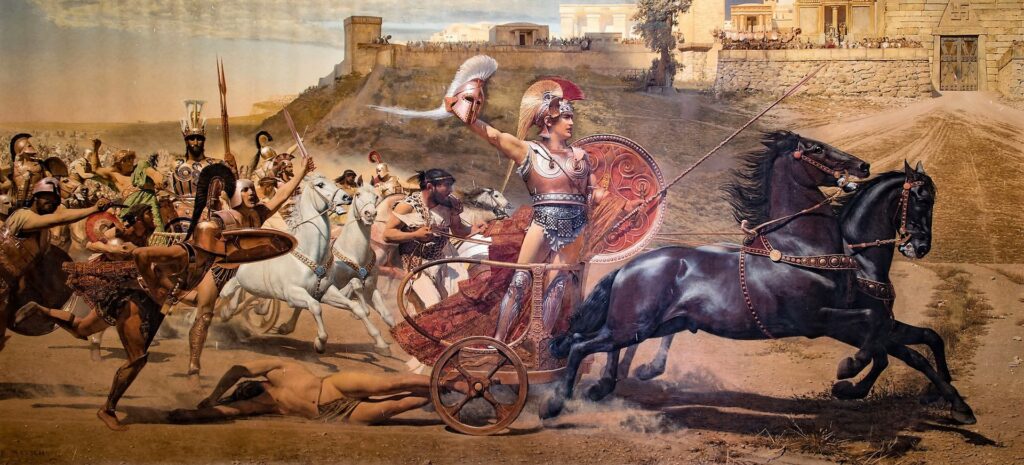
Noble Horse Names
If you wish to bestow upon your horse a name befitting royalty, then consider noble horse names. These names reflect the majesty and grandeur of the royal stables, the regal lineage, and the noble heritage of the royal steeds.
Names like “Regal,” “Majesty,” “Noble,” and “Royal” immediately evoke images of grand castles, lavish coronations, and regal processions. Other noble horse names include “Prince,” “Duke,” “Count,” and “Earl,” each carrying a title of nobility and a touch of royal charm.
But naming your horse like a royal steed is not just about choosing a noble name. It’s also about treating your horse like royalty, caring for it, respecting it, and honoring its unique personality and character. After all, a horse is not just a pet or a possession. It’s a partner, a companion, and a friend.
Medieval War Horse Name
In the medieval era, war horses were not just mere animals. They were the unsung heroes of countless battles, the trusted companions of knights and warriors. These horses were bred for war, trained to charge fearlessly into enemy lines, and conditioned to withstand the harsh realities of combat. As such, their names often reflected their warrior spirit, their indomitable courage, and their role in the theater of war.
30 names that evoke strength and courage:
- Warlord (For a horse that leads in battle)
- Rampage (For a horse that storms through enemies)
- Siege (For a horse that’s unstoppable)
- Battleaxe (For a horse that cuts through opposition)
- Warhammer (For a horse that strikes with force)
- Ironside (For a horse with a strong defense)
- Saber (For a horse that’s sharp and quick)
- Claymore (After the medieval two-handed sword)
- Longbow (For a horse that has a far-reaching impact)
- Crossbow (For a horse that’s precise and effective)
- Halberd (For a horse that’s versatile in battle)
- Pike (For a horse that’s long-lasting in battle)
- Cuirass (For a horse that’s well-protected)
- Warcry (For a horse that instills fear)
- Vortex (For a horse that sweeps enemies away)
- Onslaught (For a horse that’s relentless)
- Blitz (For a horse that strikes quickly)
- Skirmish (For a horse that excels in minor battles)
- Melee (For a horse that’s good in close combat)
- Vanguard (For a horse that leads the charge)
- Phalanx (For a horse that’s part of a strong formation)
- Arsenal (For a horse that brings a lot of skills to battle)
- Fusilade (For a horse that’s like a burst of artillery)
- Barrage (For a horse that overwhelms the enemy)
- Trebuchet (For a horse that can launch an attack)
- Catapult (For a horse that propels forward)
- Ballista (For a horse that strikes from a distance)
- Warpath (For a horse that’s always ready for battle)
- Dreadnought (For a fearless horse)
- Armada (For a horse that’s like a fleet in battle)
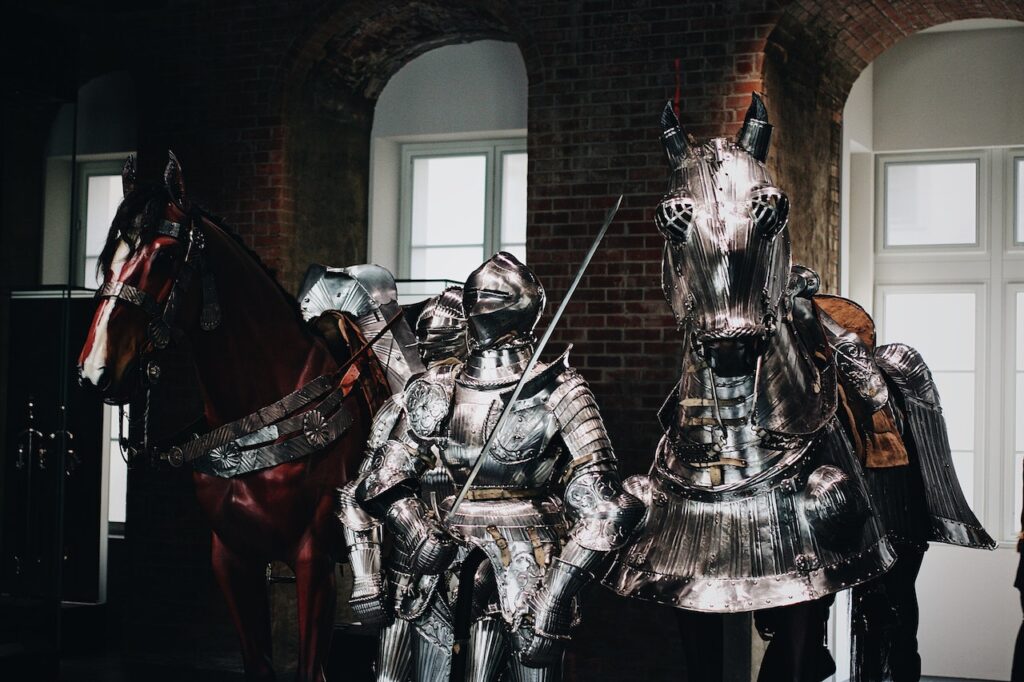
Famous Medieval Horse Names
When we think of the medieval era, our minds often drift to knights in shining armor, grand castles, and epic battles. But behind every great knight was an equally great horse—a steed whose name has been immortalized in the annals of history. These horses were not just modes of transportation; they were legends in their own right, their names echoing through the corridors of time. Let’s saddle up and ride through some of the most famous medieval horse names that have galloped their way into legend.
Here are 20 medieval war horse names that have stood the test of time:
- Bucephalus: The legendary horse of Alexander the Great, known for its immense strength and loyalty.
- Rosinante: The faithful steed of Don Quixote, a name that has become synonymous with chivalrous quests.
- Bayard: A magical horse in French folklore that could adjust its size to accommodate its riders.
- Gringolet: The trusted horse of Sir Gawain, one of King Arthur’s Knights of the Round Table.
- Babieca: The horse of El Cid, the Spanish knight and national hero.
- Friesian: A breed rather than a single horse, but so iconic it’s often associated with medieval knights.
- Hengroen: Believed to be King Arthur’s horse, a name steeped in the mystery of the Arthurian legend.
- Smoky: A horse that reportedly belonged to Joan of Arc, a symbol of divine guidance.
- Pegasus: Though more mythological than medieval, this winged horse has been a symbol of aspiration for centuries.
- Destrier: Not a specific horse but a term for war horses that knights rode into battle, a name that evokes power and majesty.
- Marengo: The famous horse of Napoleon Bonaparte, named after the Battle of Marengo.
- Copenhagen: The Duke of Wellington’s horse at the Battle of Waterloo, a name that signifies victory against the odds.
- Black Jack: A horse that, although from a later period, is often associated with military funerals, symbolizing the end of an era.
- Trigger: While not medieval, this horse is legendary and often appears in tales of knights and adventures.
- Tornado: Zorro’s horse, a name that signifies speed and agility, often featured in stories set in older times.
- Shadowfax: Though from the realm of fantasy, this horse from “The Lord of the Rings” embodies the qualities of a medieval steed.
- Silver: The Lone Ranger’s horse, a name that has become a symbol of justice and heroism.
- Palomo: Simon Bolivar’s horse, a name that has ridden through the pages of South American history.
- Chetak: The horse of Maharana Pratap, an Indian king, known for its bravery and loyalty.
- Comanche: Known as the only survivor of the Battle of Little Bighorn, a horse that symbolizes resilience.
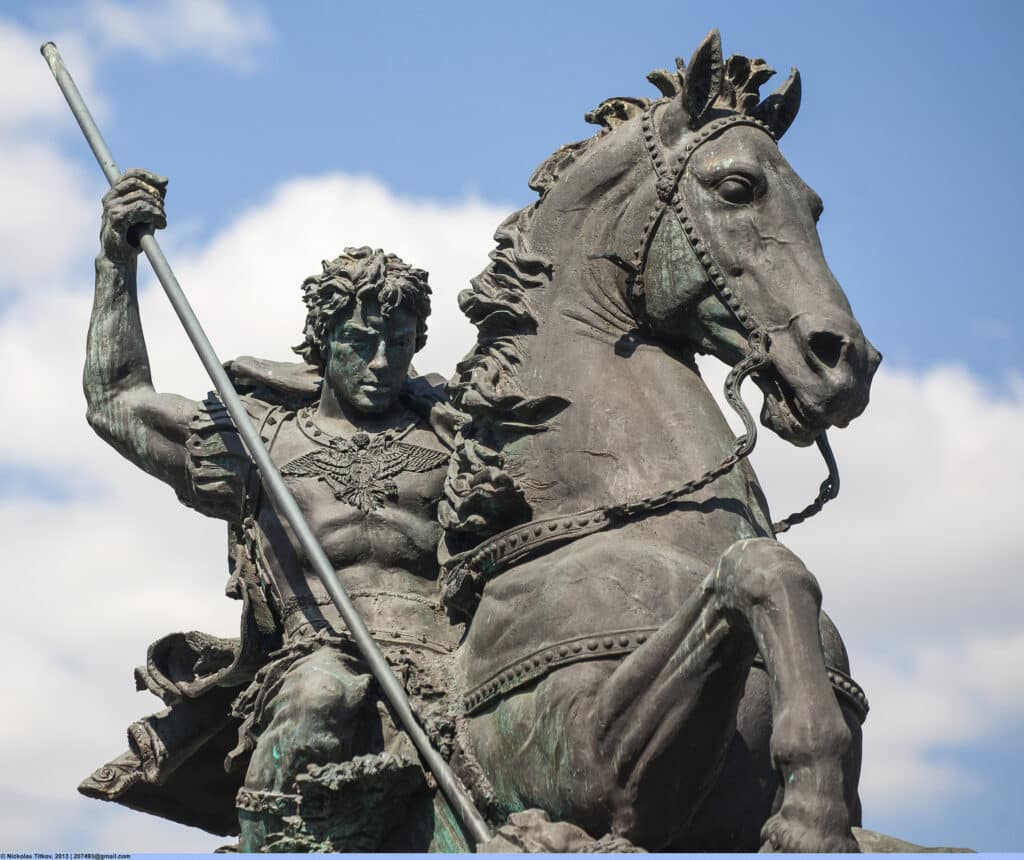
How to Choose the Perfect Medieval Horse Name?
Choosing the perfect medieval horse name can be a daunting task. There are so many options, so many beautiful and powerful names to choose from. So, how do you select the one that’s perfect for your horse? Well, it comes down to understanding your horse, its personality, its characteristics, and its unique quirks.
Consider the horse’s physical traits. Is it strong and muscular, or swift and agile? Is it tall and majestic, or short and sturdy? The horse’s appearance can often inspire a fitting name. For example, a strong, powerful horse might be aptly named “Titan” or “Hercules,” while a swift, agile one might be named “Zephyr” or “Pegasus.”
Next, consider the horse’s personality. Is it brave and bold, or gentle and calm? Is it playful and energetic, or serious and composed? The horse’s personality can also influence its name. A brave, bold horse might be named “Braveheart” or “Valiant,” while a gentle, calm one might be called “Serene” or “Tranquil.”
Finally, consider your connection with the horse. What does the horse mean to you? What emotions does it evoke in you? Your feelings towards the horse can also guide you in choosing the perfect name. A horse that makes you feel happy and joyful might be named “Bliss” or “Joy,” while one that inspires awe and admiration might be named “Marvel” or “Wonder.”
Medieval Horse Names Inspired by Literature and History
If you’re a fan of literature and history, then you might want to consider medieval horse names inspired by these fields. These names carry the weight of historical significance and the charm of literary elegance, offering a rich palette of options for your horse’s name.
From “Bucephalus,” Alexander the Great’s horse, to “Babieca,” the steed of El Cid, history provides a wealth of names that echo with the resonance of past eras. Similarly, literature offers names like “Rocinante,” Don Quixote’s horse, or “Shadowfax,” Gandalf’s horse in “The Lord of the Rings,” each carrying a story, a context, and a legacy.
Choosing a horse name inspired by literature or history is not just about naming your horse. It’s about connecting with the past, honoring the legends, and keeping the stories alive. It’s about creating a bond with your horse that transcends time and space, a bond that is as timeless as the tales and as enduring as the epochs.
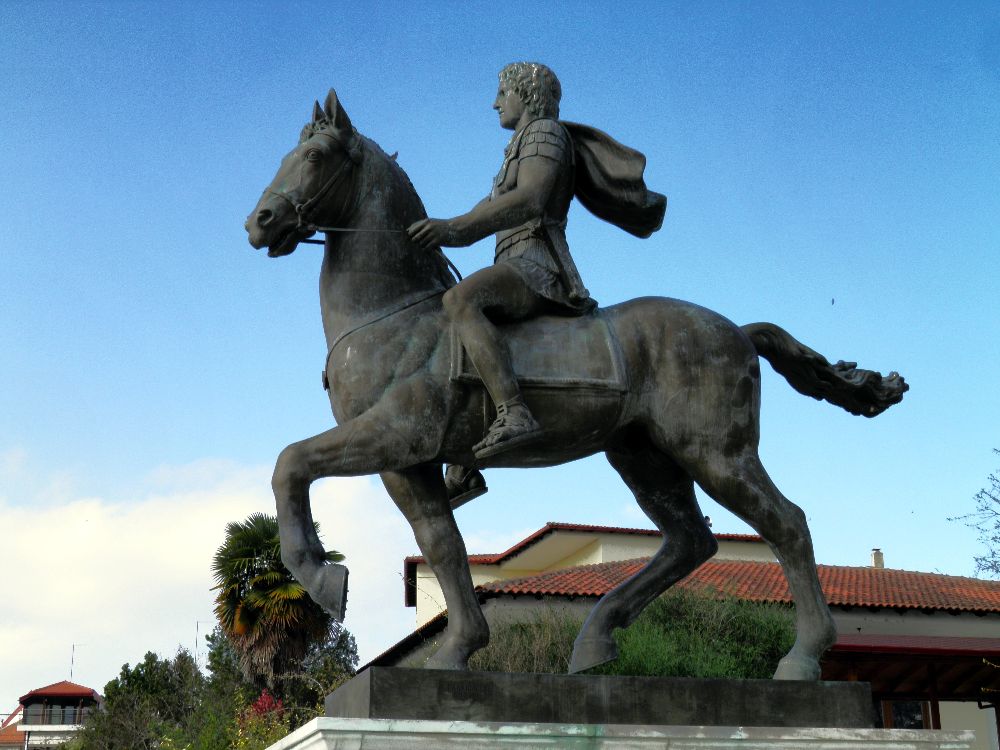
Embrace the Past with Your Horse’s Name
Choosing a medieval horse name is a journey into the past, a voyage through history, and a trek through the tales of knights and kings, warriors and nobles. It’s about finding a name that resonates with power, majesty, and the mystique of the medieval era.
Whether you choose a knight horse name, a noble horse name, or a unique medieval name, remember that it’s not just about the name. It’s about the bond between you and your horse. It’s about honoring the past, embracing the present, and looking forward to the adventures that await in the future.
So, saddle up, choose a name that fits your horse, and ride into the sunset, carrying the echoes of the past and the hopes of the future. After all, a horse is not just a horse. It’s a companion, a partner, and a friend, one that deserves a name as majestic and magnificent as it is.
Interested in learning more about horses? Read our other article about what a group of horses is called!

